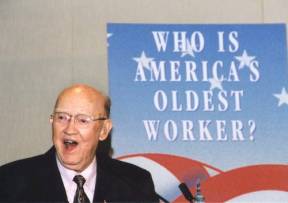

back

|
 |
Age Before Duty
Chicago Tribune
November 28, 2004

Micheline Leconte is 57 years old, but that didn't dissuade her from changing careers.
"The concept of age is just a number - that doesn't mean anything," says Leconte, who recently completed training to become a certified nursing assistant. "It's what you can learn."
Leconte worked in the medical administration field for almost 24 years. After moving to South Florida from New York, however, she experienced difficulties finding a job in her field. It's then that Leconte decided to take the plunge and pursue a new career.
"The most rewarding thing about this is I was able to learn," says Leconte, who lives in Cutler Ridge, Fla. "I reward myself for that."
Leconte is like many seniors today who are deciding to continue working through retirement or even changing careers after a lifetime of doing something else. The number of working seniors in America is expected to increase in the next decade. By 2012, 19 percent of workers will be at least 55 years old - a 5 percent increase from 2002 numbers - according to figures recently reported by Bureau of Labor Statistics economist Mitra Toossi in the Monthly Labor Review.
Changing society
"For some time, people viewed the senior cashier at McDonald's or the bagger at the grocery store as kind of a novelty," says Gerald Donahugh, a job consultant in Seattle. "We don't do that anymore. We see older adults working and we don't give it a second thought. That says a lot about our own perceptions of people."
But Donahugh is quick to point out that a new acceptance of older workers is actually more indicative of the place seniors have in society.
"People aren't ending up with the nest eggs they once envisioned for themselves," Donahugh says. "While plenty of seniors are still able to afford their mortgage or rent, they run low on money when it comes to things like eating at restaurants, traveling, cash for daily expenses - what we used to call 'walking-around' money."
For some, money isn't an issue. In fact, many seniors are choosing to work through retirement for a variety of reasons.
"In many cases [seniors] have the desire to stay mentally active. For some, there's a need for health benefits, and for some there are certainly the social aspects around the desire to keep working," says Bob Gallo, deputy state director for the Florida state office of the AARP. "Many people take retirement to pursue for the first time that desire or dream to be self-employed, whether it's consulting or starting a small business."
Flexible schedules
Seniors are also pursuing a variety of work schedules, whether it's part-time, seasonal or full-time work.
"When you don't have the usual commitments of a regular job and children, it's a lot easier to work at different times of the day," says Rose Albert, who works as a second-shift receptionist for a Oklahoma City credit union. "I always hated waking up at the crack of dawn to go to work, but I never minded working. Now I wake up when I want because I'm not starting my job until late in the afternoon."
Age benefits
For employers, there are benefits to hiring older workers - or keeping current ones on staff.
"The demographic trend in the country is we have an aging workforce and fewer younger workers to replace these workers," Gallo says. "Employers want to keep that corporate knowledge, which can disappear if you lose a lot of workers. You have skills you need that can't be readily replaced."
Williams says senior workers also help pass the torch by serving as mentors to younger workers.
"If a senior returns to work, you're getting someone who could be a mentor and example to younger employees," Williams says. "There's a contrast between the ethics of younger workers versus the ethics of the older workforce."
Senior workers do need to prove to employers that they are flexible and willing to learn new skills, disproving common misgivings that seniors are reluctant to change.
"One of the myths is that seniors are less likely to accept change, but that's not true," Gallo says. "Be flexible and be open. Think of the wealth of knowledge and skills you have accumulated and match that to the needs of employers."
Copyright
© 2002 Global Action on Aging
Terms of Use | Privacy
Policy | Contact Us
|



